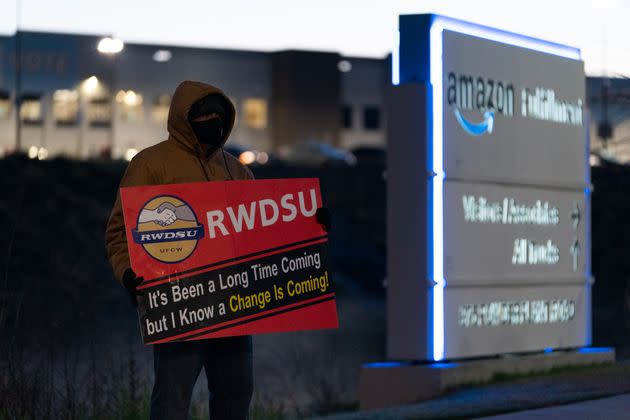Progressives Urge Biden Administration To Crack Down On ‘Union-Busting’ Industry
Every year, U.S. employers spend millions of dollars on outside consultants who specialize in breaking up union campaigns. Because much of that work is cloaked in secrecy, progressive groups are urging the Biden administration to crack down and make it more transparent.
A paper released Wednesday recommends that the Labor Department force employers and their consultants to make greater financial disclosures related to anti-union spending so workers can better understand who’s being paid to lobby them. The authors write that the firms are “deploying increasingly aggressive tactics to dissuade employees from unionizing.”
The paper was co-released by Harvard Law School’s Center for Labor and a Just Economy, the nonprofit watchdog group LaborLab, and the advocacy group Governing for Impact, which has been pushing the Biden administration to pursue progressive federal regulations.
It’s super important that those elections actually reflect the will of those workers.Sharon Block, Harvard Law School
Sharon Block, a labor law professor at Harvard and a co-author of the paper, said in an interview that the government should be shedding more light on the work of “union busters.”
“This is an urgent problem because we are seeing more organizing,” said Block, who previously ran the Office of Information and Regulatory Affairs in the Biden White House. “It’s super important that those [union] elections actually reflect the will of those workers and that they’re not a reflection of manipulation or fear or coercion.”
The recommendations come on the heels of an investigation by the Labor Department’s inspector general finding that the agency “did not effectively enforce” the law when it came to anti-union consultants.
Federal law requires employers and consultants to disclose their arrangements to the Labor Department when they’re trying to persuade workers against unionizing, often in what are known as “captive audience meetings.”
The idea is that workers have a right to know who’s trying to sway them ― and how much they’re being paid ― so they can make an informed decision about whether to unionize. Employers sometimes spend huge sums on these campaigns. For instance, Amazon spent $14 million on persuaders in 2022 alone.

Yet as a HuffPost investigation last year revealed, employers and consultants alike routinely flout the rules and leave workers in the dark amid these pressure campaigns.
Employees often have no idea how much money was spent to convince them not to unionize, and sometimes they don’t even know who the consultants were who lobbied them. In one case HuffPost reported, a consultant held anti-union meetings with workers under a fake name after having recently been released from prison for stalking.
Part of the problem is that many employers and consultants ignore the rules altogether. The Labor Department’s inspector general found that nearly half of employers’ reports and more than 80% of consultants’ reports were delinquent over a two-and-a-half-year period, resulting in “missing, untimely, and inaccurate” information during union campaigns.
Part of the problem is that many employers and consultants ignore the rules altogether.
Block said some simple policy changes could shed more light on the consulting industry and how it operates.
For instance, consultants used to be required to submit an annual report that detailed all their receipts from employers, as well as all the money they disbursed to their subcontractors. But the Labor Department stopped enforcing key portions of those requirements in 2016. Block said the agency should return to its old policy.
The Labor Department said in a statement that it “appreciates” the recommendaitons.
“We regularly review our formal regulatory agenda, our guidance and our enforcement priorities in an effort to maximize the transparency called for by the [law],” a spokesperson said in an email.
Block also made the case for the Federal Trade Commission to investigate whether employers are colluding through their consultants to prevent organizing and suppress workers’ wages.
The antitrust agency doesn’t have a track record of poking around the anti-union consulting industry, and Block acknowledged it would be “an innovative use” of the FTC’s authority. But she said the situation calls for regulators and policymakers to get more creative.
“I think it’s important for the government to look at all the possible tools to address a problem like this,” Block said. “We should be doing everything we can to make those elections as fair as possible.”
This story has been updated with comment from the Labor Department.

